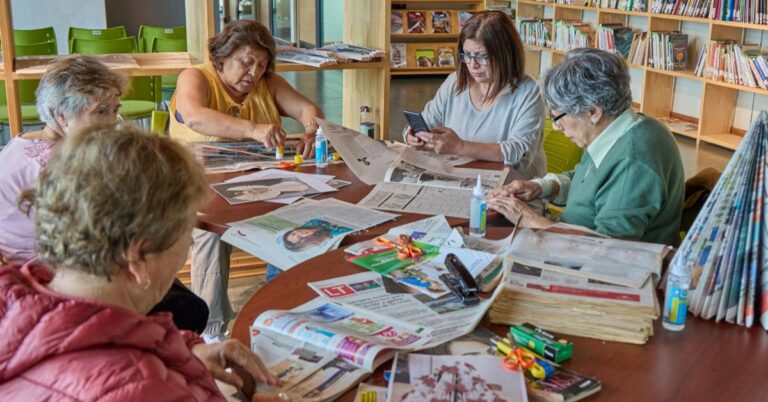
Family Connection: Seniors Share Traditions
Picture your grandmother’s hands teaching you to knead bread or the way your grandfather’s eyes lit up when he told stories about the old country. These moments matter more than you might realize, especially for seniors living in an assisted living community in Dearborn, MI.
Family traditions offer something precious to older adults—they create lasting bonds that connect past, present and future while providing seniors with continuity, connection and a strong sense of who they are.
When your loved ones participate in these meaningful customs, something remarkable happens. They don’t just collect nostalgic memories; they actually experience real health benefits that can extend and enrich their lives.
The Emotional Value of Family Traditions for Seniors
How traditions create a sense of identity
These time-honored practices act as bridges between generations, connecting seniors with their ancestors while helping them understand their unique role in the family story. Many seniors living in assisted living in Dearborn, MI, find that family traditions create shared experiences that foster genuine belonging, which becomes particularly important for those who might otherwise feel disconnected.
When seniors share recipes, rituals and customs with younger relatives, they’re doing something profound—they’re actively strengthening their sense of self while ensuring family customs passed down to the next generation stay alive.
Emotional comfort and nostalgia
Traditions spark powerful feelings of nostalgia that offer real emotional support, especially during life’s significant transitions. Seniors who engage with cherished family customs often find:
- Their mood lifts and psychological well-being improves
- Feelings of loneliness and depression decrease
- They feel connected to loved ones who may no longer be present
- They can revisit joyful memories of accomplishment and love

Reducing stress and anxiety through familiar rituals
Traditions create predictability and that predictability brings profound stability and comfort to seniors. Familiar rituals provide structure that helps them navigate life’s challenges, offering safety and reassurance when times feel uncertain. For seniors with cognitive impairments, established routines can dramatically decrease stress and anxiety by creating patterns they can rely on.
Passing Down Traditions to Younger Generations
Why storytelling matters
Stories hold power that photographs and documents simply can’t match. When you tell your grandchildren about how your own parents met or describe what life was like when you were their age, you’re giving them something irreplaceable. These narratives help younger family members understand where they come from and who they are in the bigger picture of your family’s journey.
Cooking and recipes as cultural memory
That recipe for your mother’s apple pie carries more than measurements and instructions—it holds decades of family gatherings, celebrations and love. When you teach your grandchildren to make these special dishes, you’re handing down much more than cooking techniques.
Celebrating holidays together
Holiday celebrations give you natural opportunities to share what matters most to your family. Making these times meaningful doesn’t require elaborate planning—it just takes intentional inclusion:
- Invite younger family members to help with preparations from an early age
- Give them increasing responsibility in family traditions as they grow
- Welcome their ideas for adapting traditions while keeping core values intact
Creating keepsakes and memory books
Sometimes the most precious gifts are the ones you create together. Memory books filled with photographs, letters and family stories make your history accessible to generations who weren’t there to experience it firsthand. Consider involving grandchildren in these projects directly. Let them add their own drawings, thoughts, or questions to the family narrative.
Modern Tools to Keep Traditions Alive
Using video calls to celebrate remotely
Video chat brings families together in ways that seemed impossible just a generation ago. For seniors who can’t be physically present with loved ones, these virtual gatherings become lifelines that help maintain essential family relationships. Grandparents can now join birthday parties, share holiday meals and even read bedtime stories to grandchildren who live across the country.
Sharing memories through social media
Cloud-based platforms have made family history preservation a shared family project. Seniors and their relatives can now contribute stories, photos and memories regardless of where they live. Rather than using general social media, specialized apps like Confinity and StoryWorth offer private spaces where seniors can save precious memories without sharing them with the entire world.
Recording audio or video interviews with seniors
Time has a way of taking our stories with it. Recording your loved one’s voice and memories can change that. Here’s how to capture these precious narratives:
- Use simple tools like smartphones or tablets in comfortable, familiar settings
- Set up remote interviews through phone or video calls for distant family members
- Start with a casual conversation to help them feel relaxed
- Ask questions that invite storytelling rather than yes-or-no answers
Maintaining Traditions for a Richer Senior Living Experience
Your family’s story deserves to continue. These traditions—whether they’re handed down from great-great-grandparents or starting fresh with your own children—create the threads that connect your past to your future. They remind your senior loved ones that their lives have meaning, their stories matter and their wisdom is treasured. Ready to explore how assisted living communities can support your family’s tradition-sharing journey? Contact us at (800) 642-4663, learn more about The Commons Corewell Health – Senior Living – Dearborn.
FAQs
Q1. How do family traditions benefit seniors in assisted living?
Family traditions provide seniors with a sense of identity, emotional comfort and reduced stress. They help maintain connections with loved ones, preserve cultural heritage and can even contribute to better mental health and cognitive function.
Q2. What are some ways to share family traditions across generations?
Sharing family traditions can be done through storytelling, cooking together, celebrating holidays, creating memory books and using modern technology like video calls and social media to stay connected with family members who are far away.





